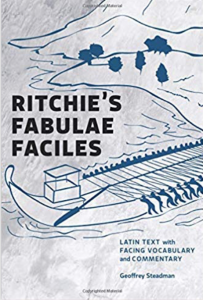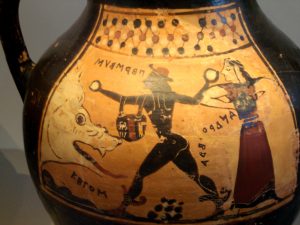This summer, I worked with Professor Dozier on recreating a new introductory Latin curriculum. Traditionally students learn Latin by rote memorization of noun charts and verb forms. The high focus on memorization makes Latin inaccessible to many different students, which is why this class is designed to focus on translation rather than memorization; this shift allows students to jumpstart on the actual purpose of learning Latin, which is translating Latin texts.
We used Ritchie’s Fabulae Faciles with a commentary by Geoffrey Steadman as the main text for this class. This Latin textbook contains increasingly difficult stories about different mythological heroes. Since the book was designed for intermediate Latin students, we systematically reworked the first twelves stories about Perseus for introductory Latin students to begin translating on their first day of class. After the initial reworked version, we produced a version of medium difficulty, which would require more grammatical knowledge of students. Finally, the last version of the text would be the original version of the Fabulae. This focus on translation allows students to gain the skills necessary to translate Latin text rather than harnessing the skills to reproduce grammatical structures.
We decided to enhance the class further by researching the Latin language itself. We read books concerning the history of the language such as Ad Infinitum: A Biography of Latin by Nicholas Ostler. Vox Latina gave us insight into how modern people know the pronunciation of the language. We also explored James Lang’s Small Teaching: Everyday Lessons from the Science of Learning in order to integrate innovative pedagogical methods into the class.
By stepping away from the traditional methods of teaching an introductory Latin class, the goal of this new curriculum is to not only enhance students’ knowledge of Latin in a more accessible and translation-based manner, but for them to also have a broader knowledge of the history of the language itself.


